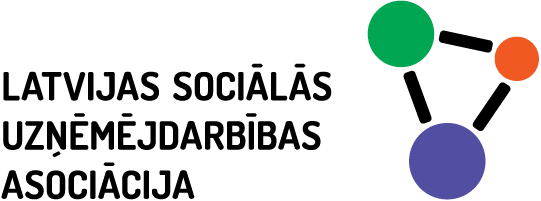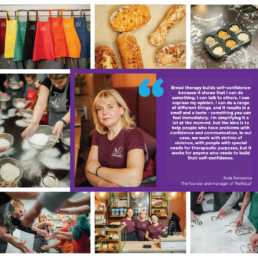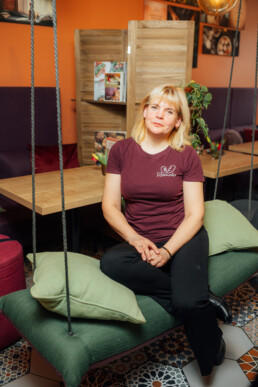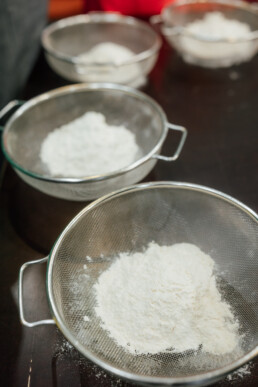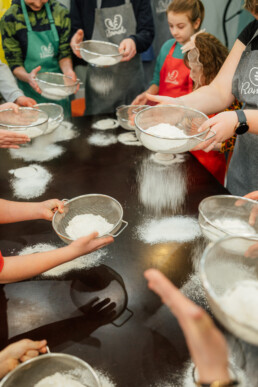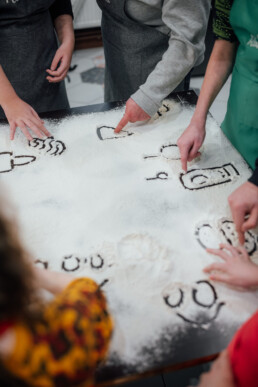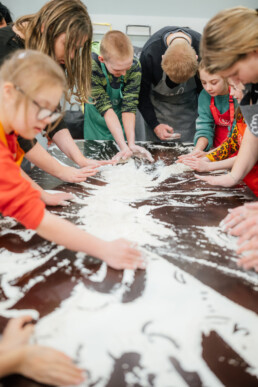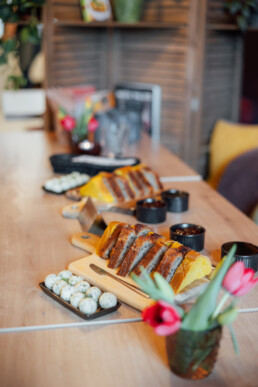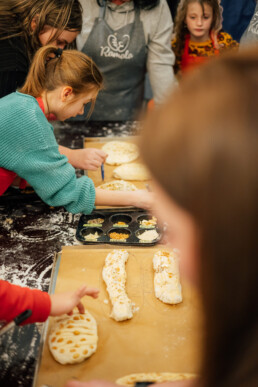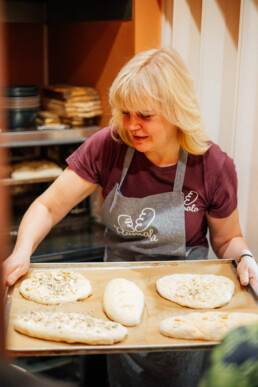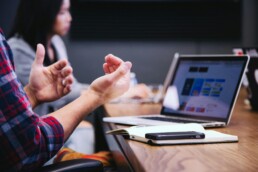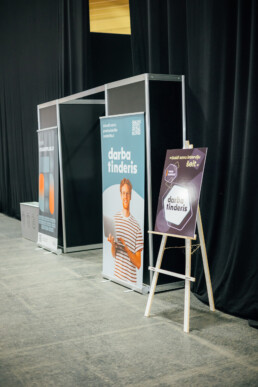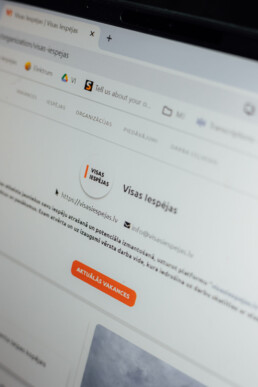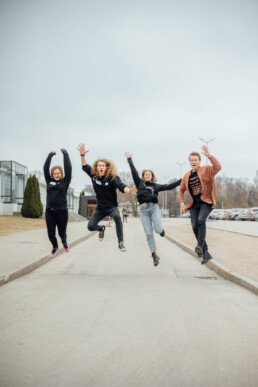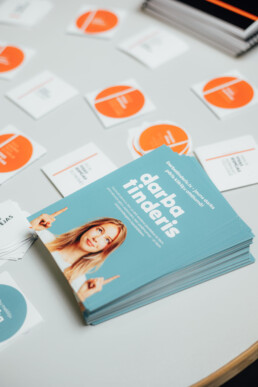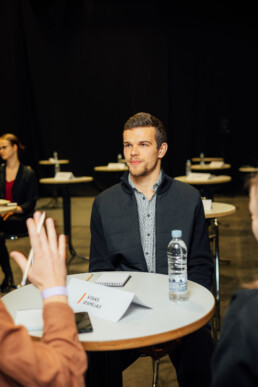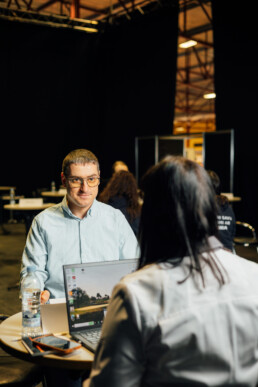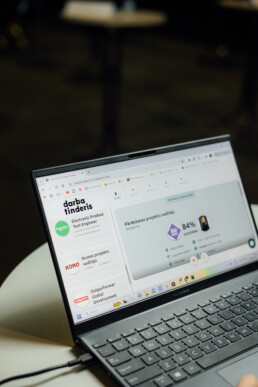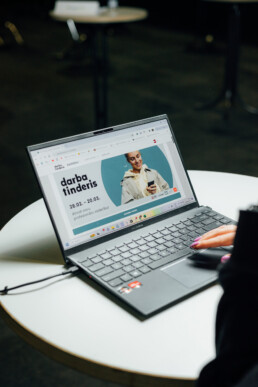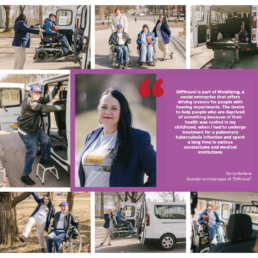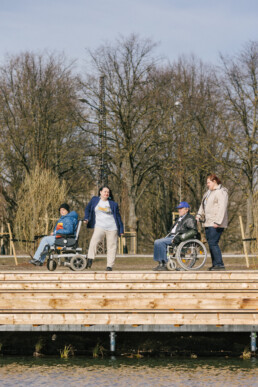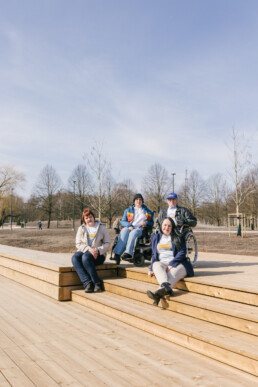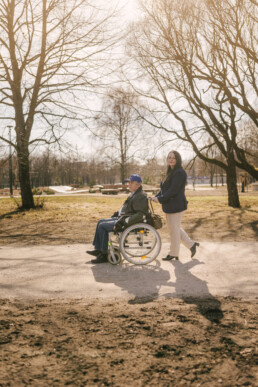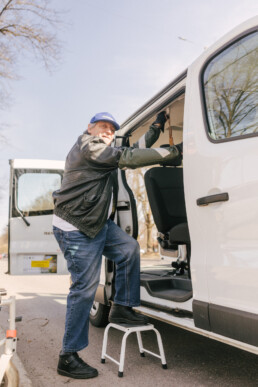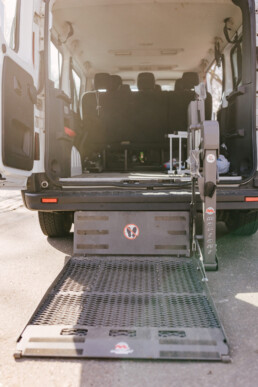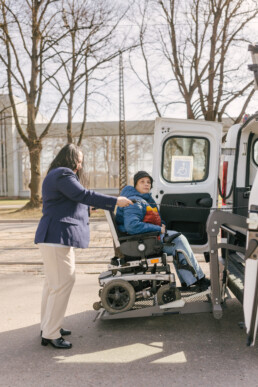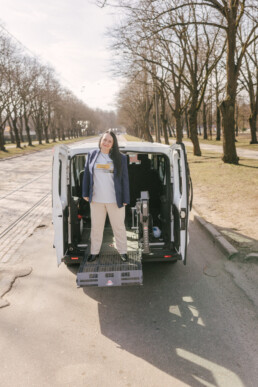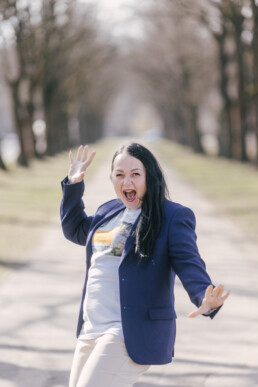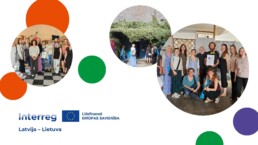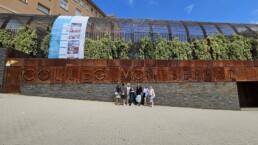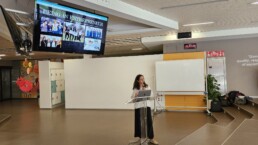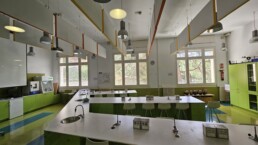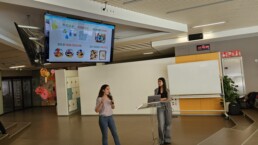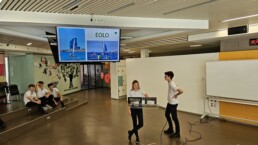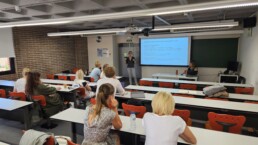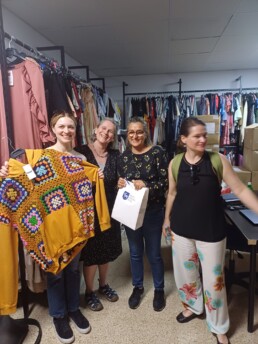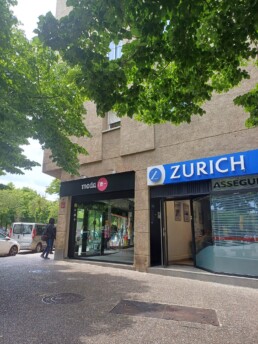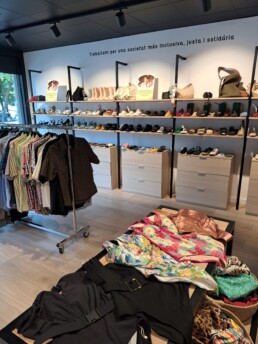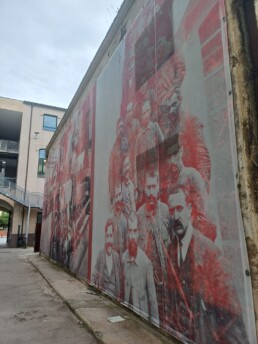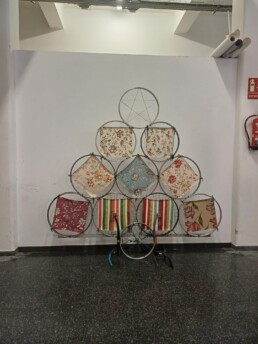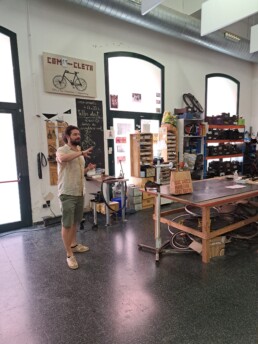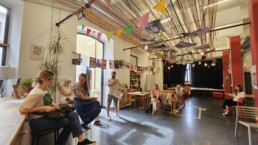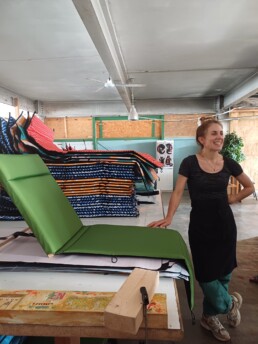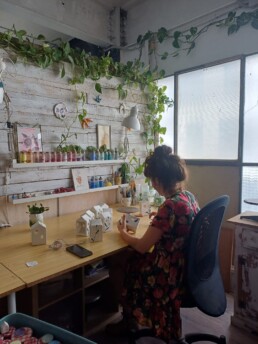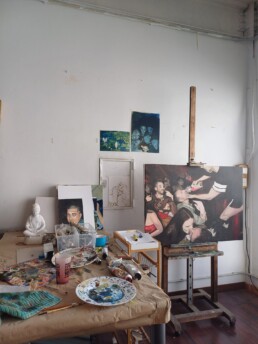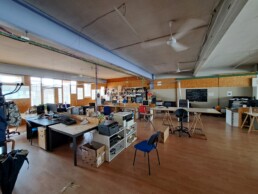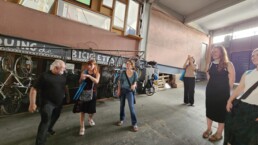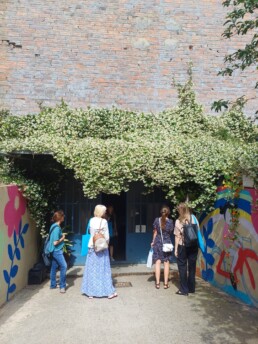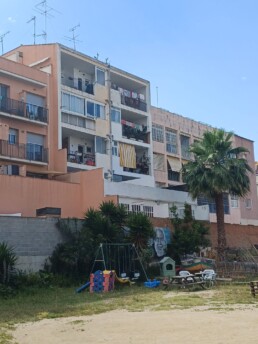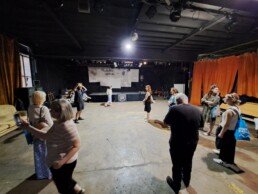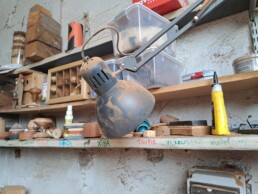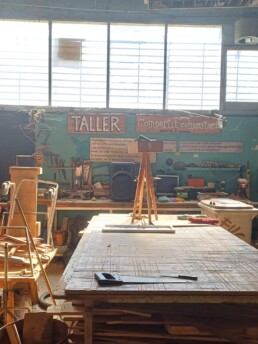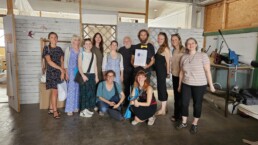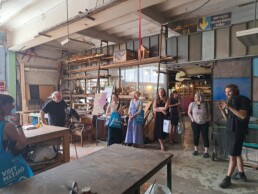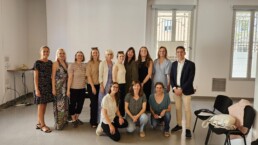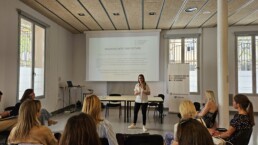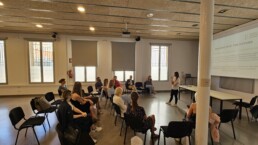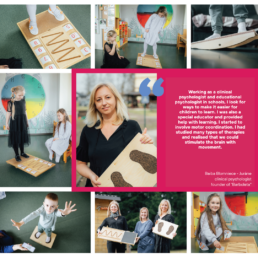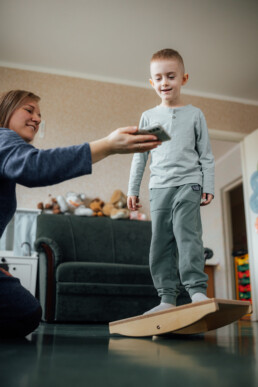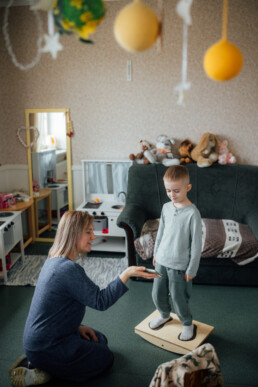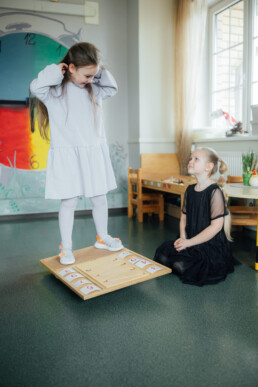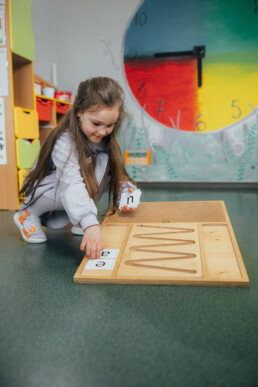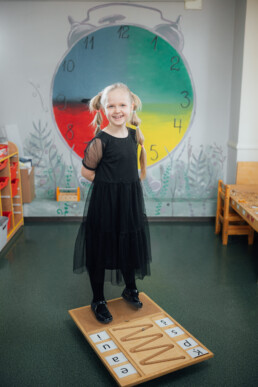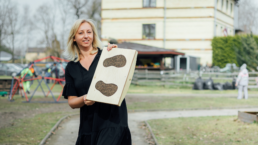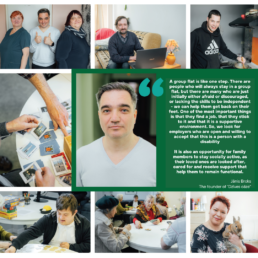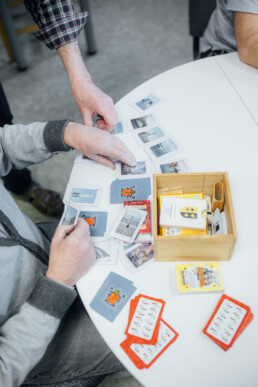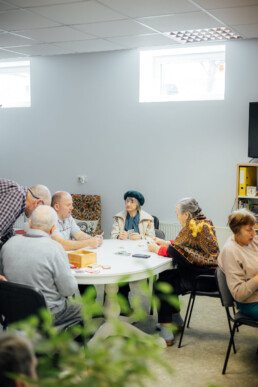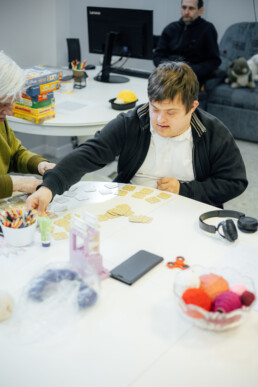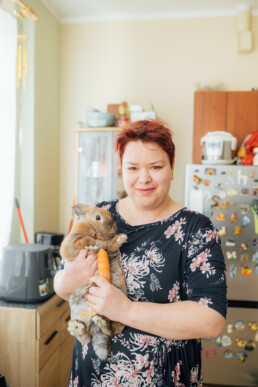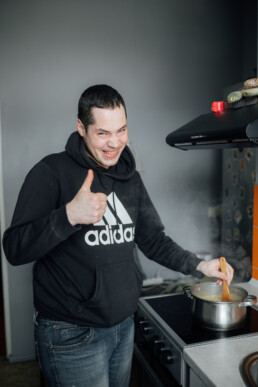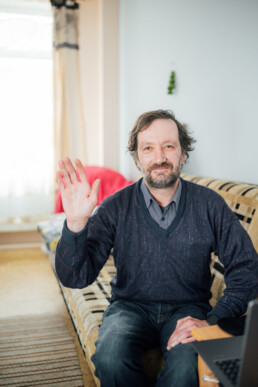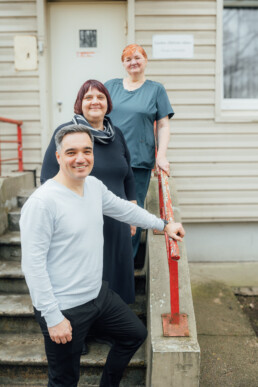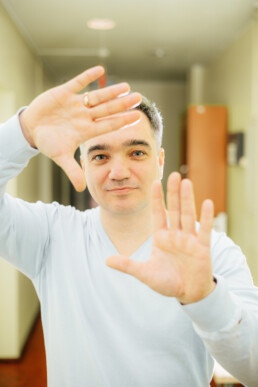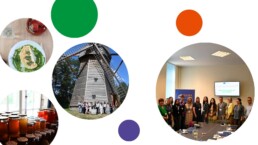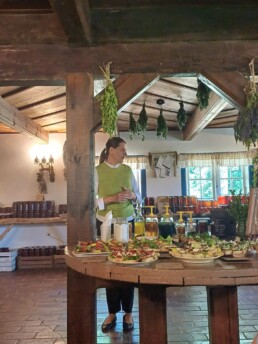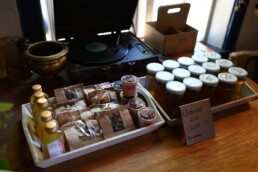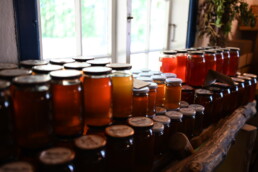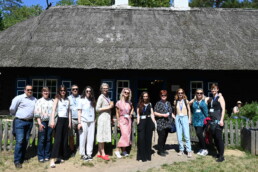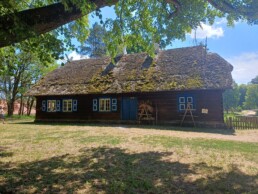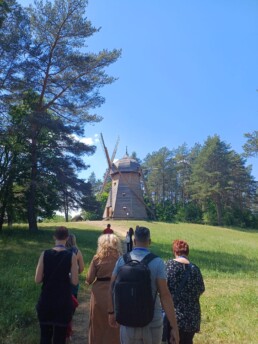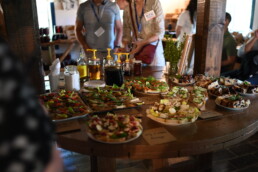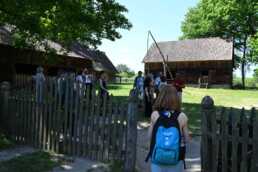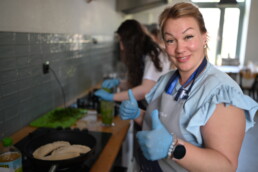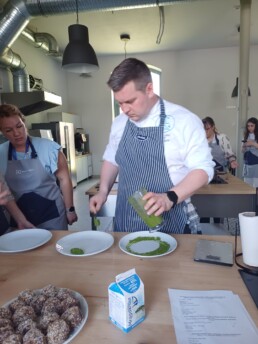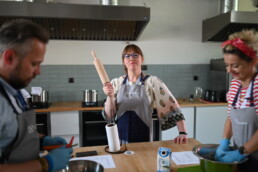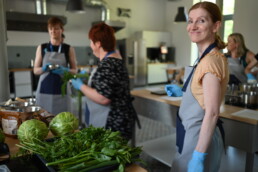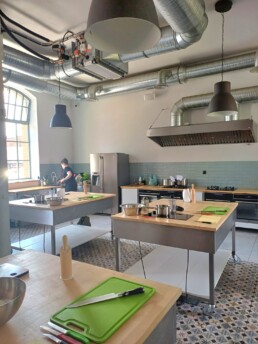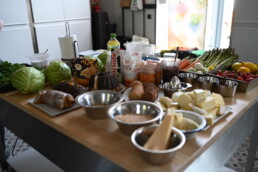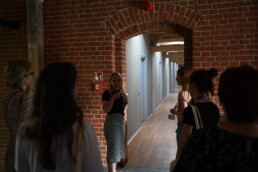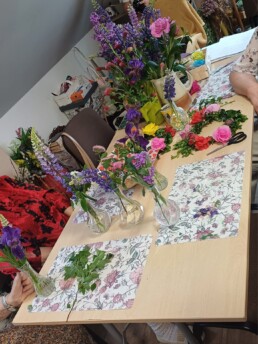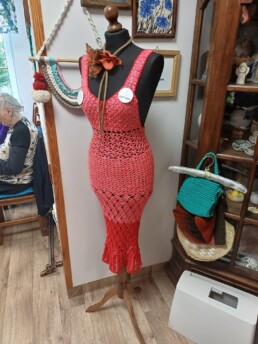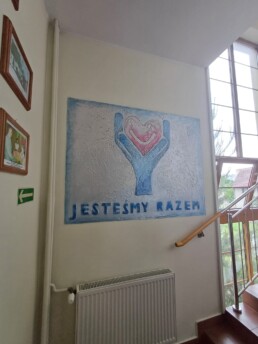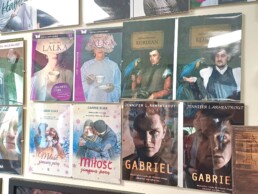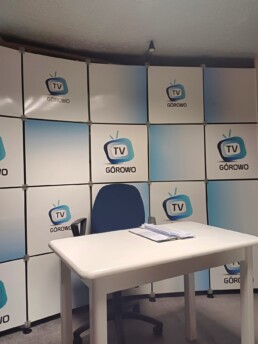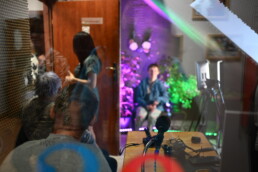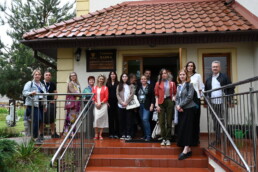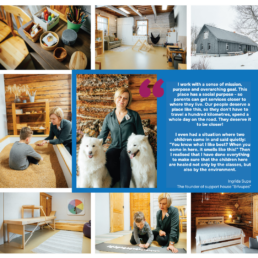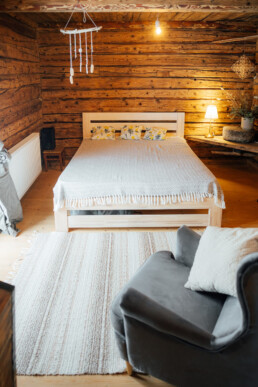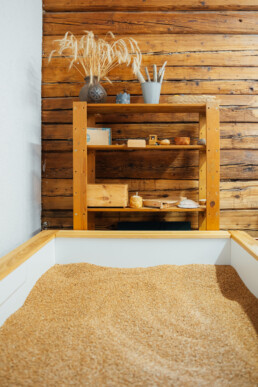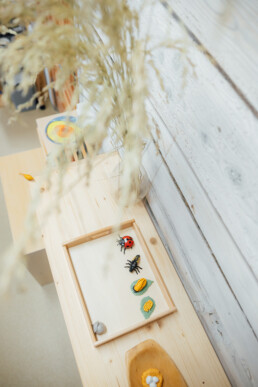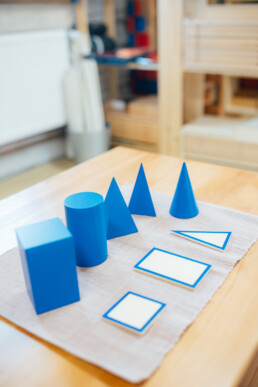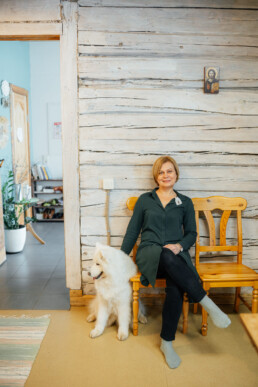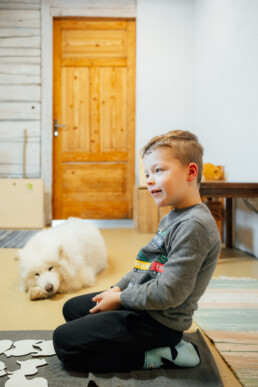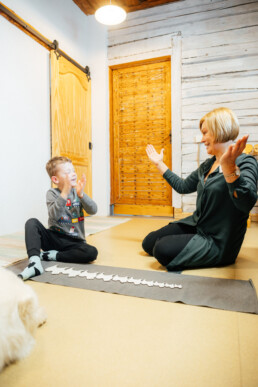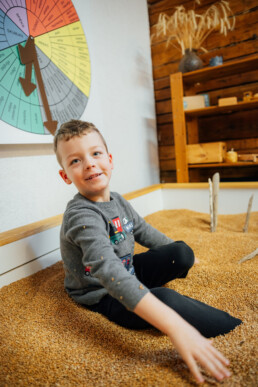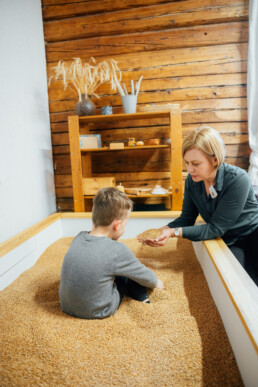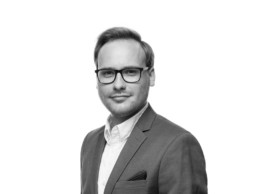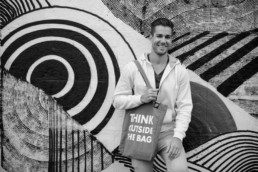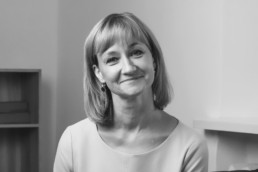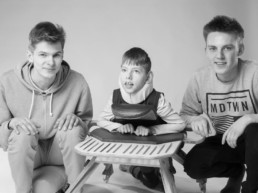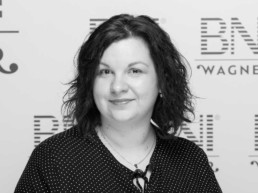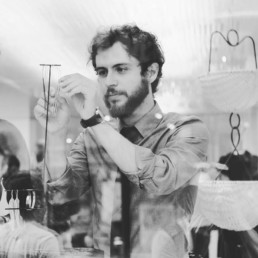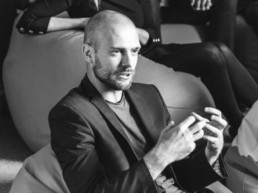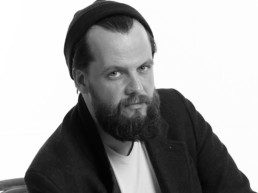Creative Bread Laboratory "RaMaLa"
Creative Bread Laboratory “RaMaLa”, Ventspils
Innovative social rehabilitation service – bread therapy for victims of violence and people with special needs; café and catering services.
Lielais prospekts 48, Ventspils, LV-3601
+371 26480162
The social enterprise “RaMaLa” has brought to Latvia a perhaps less familiar form of therapy – Bread Therapy. It is a method of working that helps different people to create an atmosphere of trust and a feeling of home by baking and sharing bread together. It is also another way to help victims of violence, people with special needs or simply those who need to build their self-confidence and realise their worth.
“These values are very important in today’s society – the opportunity to be heard, to be appreciated, which is disappearing in today’s age of haste and stress, and people feel lonely, it is perhaps more difficult for them to get along with others, to prove themselves,” says Ruta Šenkevica, the owner of the Creative Bread Laboratory.
The idea comes from the “Bread House” in Bulgaria and was inspired by research on how people in different communities in different parts of the world use their time to cook together. It’s a wonderful way to bring people together and unite them, as everyone involved in the process becomes more open and honest. “RaMaLa” in Ventspils is now a full member of Bakers Without Borders, a network that works with this form of therapy all over the world.
“On an exchange visit to Bulgaria, together with the specialists of the crisis centre “Paspārne”, we discovered this form of therapy. It has very good results, and it’s here and now, because from the very first session, the person is very satisfied with what they have done and how they have done,” says Ruta. “Bread therapy builds self-confidence because it shows that I can do something, I can talk to others, I can express my opinion, I can do a range of different things, and it results in a smell and a taste – something you can feel immediately. I’m simplifying it a lot at the moment, but the idea is to help people who have problems with confidence and communication. In our case, we work with victims of violence, with people with special needs for therapeutic purposes, but it works for anyone who needs to build their self-confidence.”
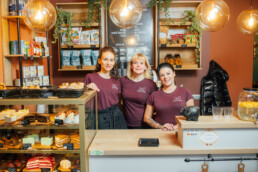
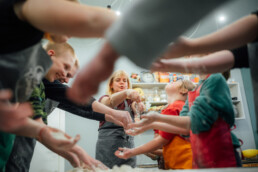
The method is also integrated into leisure activities for both children and adults. This generates income, which allows bread therapy to be provided free of charge to the target groups. Eight such free sessions can be provided per month – there is no possibility of offering more, as there is dedicated time for paid events that can cover the costs. The free groups are for both adults and children and are run by two organisations: the crisis centre “Paspārne”, which is also the founder of the social enterprise “RaMaLa” and helps victims of violence, and the day centre for people with special needs “Cimdiņš”.
“There are also special cases. For example, if a mum calls and says she wants to organise a birthday party for her child who has special needs, we always find a way to offer discounts, and there are discounts for independent clients too. We are very flexible – if it’s a client from our target group, then we give them the service on a slightly different basis,” explains Ruta.
In Bulgaria, this type of therapy works a lot with Syrian refugees, also with Romanians, with Roma people. “We saw how well it all worked, but we knew there was no money, because you also need the material basis for it, not just the knowledge. But we went, we studied, we took exams – it’s not that easy. Back in Latvia, we were looking for ways to implement this type of therapy service, and that was when the first support programme for social entrepreneurship opened, when we could apply for Altum grants. At that time we hadn’t yet set up a limited liability company, we had a crisis centre through which we applied for a grant. We were able to start our activity thanks to the grant of the crisis centre. We got funding for a year. We looked at the premises, renovated them so that we could also do business. Then, with the next grant, we set up a company, and we have been working as a limited liability company since 2020″, Ruta recalls the journey to the company that is working well today.
They are looking for staff with a background in pastry and cooking, but the classes are run by one person – Ruta herself, who is trained and qualified to do so. So, in principle, there are two different parts to the business. One is simply catering, the other is everything that goes on in the classroom, where there are therapeutic classes, entertainment workshops, bonding events and everything else that can be done to earn money to realise the social aims of the company. “RaMaLa” employs eight people at the moment, with additional staff in the summer season.
“We received our first grant as a work integration social enterprise. The employees were those who needed it – women who were long-term unemployed, Roma women. Not only did they learn how to bake the perfect cakes that everybody loves, but now they are working in other jobs. They have learnt what discipline is, what professional relations are, and so on. The fact that you see the results is probably what motivates you to keep going,” says Ruta.
“RaMaLa” could also compete as a regular café – the quality is good, customers have recognised it. There are companies that deliberately choose the services of this place year after year for its social purpose. But no one is resting on their achievements – various innovative ideas are also being brought to life. For example, we offer also cakes for pets.
“We had a little chef school for children and they expressed that they wanted to learn how to cook treats for their pets. So, we made cakes and biscuits for the dogs and cats, and the Ventspils Canisterapy team came and tested the treats. It is true that those who are working with people from difficult situations, all the closest partners are from different alternative therapies, methods e.g. canister therapy, reitherapy, pedagogical riding – we bring in as many different resources as possible to get a positive result in these rehabilitation services. Dogs are also one of our partners, hence these cakes for dogs,” says Ruta with a laugh.
The plans for the future are also clear – documents are being prepared and everything is being sorted out to create a franchise and bring this type of place to other cities. “There are already plans, business partners who are ready to try something in Riga. We have the ideas, but we lack the funding at the moment, so we are waiting for the support programme to be able to go all the way,” says Ruta. If “RaMaLa” becomes a success in Riga, then perhaps other cities could be considered.
“Both the association (crisis centre) and the social enterprise are my creation, they are my ‘children’, and I see the good sides when both of these places work well. You can bring so much positivity to people! At the end of the session, there is a moment when they take the towels off the covered bread… You can’t describe it – the feeling, the energy that comes when the children see that they have done so well, that everything smells like warm bread! I guess that’s what motivates me – that moment,” says Ruta Šenkevica.
Initially, Ruta set up a crisis centre because there was no such thing in Ventspils – people could not get all the help they needed in one place. “I used to work for a human rights support network that was active all over Latvia. The programme was coordinated by Rūta Dimanta and the NGO Centre in Riga. Together with Rūta and other people from different regions, we created this network and talked about everyone’s rights and what they were entitled to. It was a crazy time twenty years ago – resources in Latvia were very scarce and NGOs were the ones who could give people hope and support. At that time, the idea came up that there should be a crisis centre in Ventspils. Through this support programme I helped young mothers who, for example, had nowhere to live because they had a violent husband who was chasing them out of the house. That’s how it all came together and the crisis centre was created,” Ruta recalls the beginning of her work. Gradually it became clear that more needed to be done, because the crisis centre was selling a service to the state, and the state was not prepared to pay for a broad basket of services. Trying to find more money led to this business idea.
Global Data Overview for Social Enterprises 2013-2023
The World Economic Forum and the Schwab Foundation have issued a report on social enterprises in the global environment, providing a comprehensive overview of prevailing trends. The report uses data from over 80 countries, collected over the period from 2013 to 2023. Its aim is to inform policymakers and business leaders about the underestimated contributions of social enterprises to global GDP, employment, and the implementation of sustainable development goals.
A social enterprise encompasses both components — business and social welfare — promoting innovative solutions that not only create economic value but also provide significant social and environmental impact.
It is estimated that in 2021, there were approximately 333.34 million companies worldwide. The report, “The State of Social Enterprise: A Review of Global Data 2013–2023” identifies 9.79 million social enterprises, making up only about 3% of all companies globally.
The global report data indicates that there are:
~10 million social enterprises;
~ $2 trillion in total revenue generated by social enterprises;
~200 million jobs created by social enterprises;
~3% the proportion of social enterprises out of the total number of companies worldwide.
Social enterprises also help to reduce the gender inequality gap, as one out of two social enterprises worldwide is led by women. In traditional businesses, only one in five is led by women. Although the proportion of women-led social enterprises is consistently high, the average percentage varies across countries. Among the countries with the lowest representation of female leaders are Bangladesh, the Democratic Republic of Congo, and India, where slightly less than 25% of surveyed social enterprises are led by women. Conversely, in Latvia, Ireland, and Sweden, almost 70% of social enterprises are led by women.
This report reflects not only the numerical environment of social entrepreneurship but also highlights the significant challenge of obtaining and compiling these data. However, these data are crucial for understanding how this sector could be developed further.
Employment data in social enterprises (total figures or averages) were available in 81 countries. The average is 18 jobs per social enterprise (median – 14). A single social enterprise creates between one to 84 jobs.
See the chart showing the average number of created jobs per social enterprise in each country!
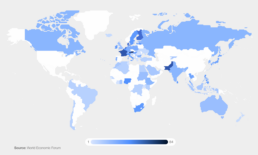
Based on the available data, the majority of social entrepreneurs seek external funding sources to finance their organizations. For example, in Europe, nearly 75% of social enterprises, surveyed by the European Social Entrepreneurship Overview, seek external funding. Typically, external funding constitutes about 75% of the annual revenue of social enterprises on average.
Data from 35 countries and a survey conducted by the Schwab Foundation’s Global Social Entrepreneurship Alliance show that social enterprises face obstacles throughout their operational cycle—from establishment to growth and expansion. Although conditions vary across countries, social enterprises worldwide generally encounter the following barriers:
- Limited access to funding;
- Low public and policy-maker support;
- Inadequate legal and/or fiscal regulation;
- Limited access to procurement processes.
Explore the study results
This report also includes data about Latvia. This data was taken from the European Social Enterprise Monitor (ESEM), assisted in Latvia by the Latvian Social Enterprise Association.
Social enteprise "Visas Iespējas"
“Visas Iespējas”, Riga
Gathers youth organizations and diverse projects in Latvia and the rest of the world; organises youth and business speed dating and Job Tinder.
+371 28663646
The aim of the social enterprise “Visas Iespējas” is helping young people find opportunities ranging from scholarships and exchange programmes to internships, volunteering and permanent work. Social enterprise has been running for almost six years and, in addition to the above, offers mentoring programmes and training.
The biggest task so far has been the participation in “Go Remote” project, which aimed to help young people from the regions find ways to work remotely without having to move. The project was developed in partnership with six other countries – Croatia, Bulgaria, Cyprus, Iceland, Finland and Norway – and has trained around 500 people and provided mentoring to 200. But the total number of people helped over the lifetime of the company cannot be easily put into numbers immediately. “It is very difficult to give a figure, but we know that 3 000 people have participated in Job Tinder, 500 – 700 have gone through training, 200 have applied for mentoring, 15 – 20 thousand people use the website every month. We have reached more than 1,500 young people in schools,” says Gustavs Mārtiņš Upmanis, the company’s CEO.
The selection of information on the website is simple – it tries to include everything that can help young people from the age of 14. The partners are mostly youth organisations, which means that there are also a big offer of exchange programmes and development courses. “The moment we design the programmes ourselves, we look at what our unique contribution is. And there are four areas that have crystallised – mentoring, online learning, job opportunities and meeting young people in schools.”
To expand job opportunities for young people, five-minute interviews with companies are organised – each jobseeker meets four/five companies to talk to in a four-hour period. Now, there is also a new opportunity called “Job Tinder”.
Mentoring has proven to be an important part because it helps all young people, whether they have challenges in their lives and are struggling, or, on the contrary, have done well but want to achieve as much as possible. “Advice from someone who has been further in life than you always helps,” says Gustavs.
Another important aspect is the school programme, where “Visas Iespējas” wants to be “a multiplier of what is happening in Latvia, telling about everything that is possible, including career development”. “Schools can’t give that much because industries are moving forward, it’s very difficult to include it all in the school curriculum. So we want to be the ones going around and talking about these opportunities,” Gustavs explains.
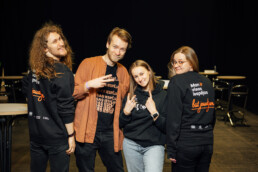
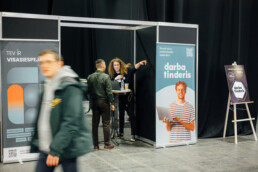
Social enterprise “Visas Iespējas” finds employees through its own channels – both through its own “Job Tinder” and by advertising vacancies on social networks. “The best part is that the young people who follow us and love what we do are the ones we want to have in our team. We are looking for the ability to think, the ability to develop, a strong desire to grow ourselves and to help other young people to grow and develop,” Gustavs says. The company currently employs 14 people (nine of them full-time), and the geography of the workforce is quite broad. “At the moment, one girl lives in Lithuania and one in South Korea, so we are also very much into remote working.”
The social enterprise also has sales people, which is perhaps not very typical for a youth company, Gustavs admits. “Visas Iespējas” gets its funding in three different ways. For mentoring and training, it is mostly project money, while for employment-related activities (e.g. “Job Tinder”), the core business provides the funding. In other words, companies have to pay for their participation, which helps to make these tools sustainable.
“There are also IT projects where we have our own team. If we have spare capacity and projects come up, we are very happy to provide IT services to external clients. At the moment it’s the least active part, but there are moments when it gets busier,” says Gustavs. The social enterprise status, in turn, has allowed them to apply for grants, which has been a good support for further activities.
But how did the idea of creating up such an enterprise come about? It all started with another idea – a website called “Kurp.es”, which gathered information about various events in Latvia. “We realised that there was a problem that young people didn’t know what to do and we had a ready-made IT solution and that we could help with and that it was such a unique thing – if we didn’t do it, nobody would. That’s where the motivation came from, the conviction that it was worth getting involved,” Gustavs recalls. He has a Master’s degree in Business Information Management – how to manage IT companies and platforms, how to build IT structures in different organisations – but he realised right away that business has more added value if it is social – if it can help someone solve a real problem, rather than, for example, selling them something they might not need.
“I think it just comes from life, from family, from the values that I have, that it’s worth doing something that’s good for somebody. That’s how it started. Even this first company, which wasn’t technically social, it was still about helping people. Being an entrepreneur is the only nature I know. I just don’t have the zest to do things that only bring in money. There is more excitement in doing things that help others in a sustainable way. And I strongly believe that a profitable business is also the most sustainable way to mobilise people – through money – to come together for a common cause and solve a problem. Every day, full time. Then the change grows bigger and bigger,” says Gustavs Mārtiņš Upmanis.
The plans for the near future are also clear – to focus on the things that have already been developed, to build on them and, for example, to offer “Job Tinder” in other countries. “At the moment, “Job Tinder” is for young Latvians, there are only a couple of international companies that don’t have an office in Latvia. But we plan to expand it within a year – there are already companies interested in Lithuania and Estonia, and we are also interested in seeing how it can be expanded,” Gustavs notes.
Social enterprise "Difftravel"
“Diffravel”, Riga
Adapted tourist services and transport providing a full travel service for people with hearing, visual or mobility impairments or reduced mobility.
Graudu iela 68A, Rīga, LV-1058
+371 24888028
Travelling is no longer an exclusive activity, but still not everyone has access to it. That is the reason why the social enterprise Difftravel was created – to provide transport services and tourism opportunities for people with various disabilities or reduced mobility. And to do it in a way that will leave them with fond memories long after the trip – a sort of emotional therapy.
It all started with small trips around Latvia, but now Difftravel organises trips to European countries as well, and plans to develop it more and more. Santa Beitāne, the company’s CEO, emphasises that this is a slow-growing but sustainable business niche with great potential. “This will be our third season, but we haven’t really stopped over the winter either – we’ve been going to warmer places. In the autumn, when the local season ended, we went to Germany, we had Christmas in Prague, then we visited Cyprus and at the end of April we were in Switzerland. And then the local season starts again,” says Santa.
Difftravel differs from a regular tour operator because it adapts the trip plan to its clients needs – knowing that these travellers will not be able to move quickly and will each have their own specific needs, travelling in small groups (no larger than 30 people) and making sure that everyone is comfortable throughout the trip.
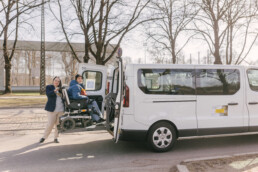
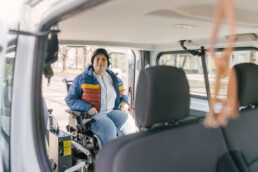
“Difftravel is part of Mobilizing, a social enterprise that offers driving lessons for people with hearing impairments. The desire to help people who are deprived of something because of their health was rooted in my childhood, when I had to undergo treatment for a pulmonary tuberculosis infection and spent a long time in various sanatoriums and medical institutions,” says Santa Beitāne.
But how did the idea for such a special tour company come about? “I wanted to do this for a very, very long time. I think it was 2008 or 2010, but there was absolutely no infrastructure for it in Latvia at that time, and I couldn’t do it alone. The support organisation for people with disabilities “Apeirons” has done a lot in terms of accessibility, a lot has been achieved and improved, and the general perception is slowly changing. However, compared to other European countries, there is still a lot to do. There, for example, accessibility is available even very, very high up in the mountains, where the conditions are supposedly difficult. We still have room for improvement here in Latvia, but we can also see improvements,” says Santa Beitāne.
The choice of trip routes and destinations in Latvia is therefore based on the principle of roughly defining the destination and then assessing which attractions, places of interest or interesting businesses are available along the way. After that, it is a matter of contacting and checking whether, for example, a wheelchair user will be able to get to the chosen point and enjoy the offer. The websites of municipalities and tourist centres are also a good help.
Travelling to other countries is much more complicated. It all starts with booking hotels, which is a lot of work as availability is not always sufficient. “The word ‘accessible room’ does not mean that everything is really adapted. Many people think that if a wheelchair can fit through the door, it’s accessible for disabled people. So you have to get in touch and ask for details: do the toilet have handrails, does the shower have a grab bar, how wide is the door, how high is the bed…,” says Santa. Reservations often need to be changed, and transport availability needs to be thought of right away. For example, when organising a trip to Switzerland, Santa left earlier so that she could bring the bus all the way across Germany to Switzerland and leave it at the airport. Then she flew back to Latvia and joined the group so that she could have the journey from the airport in her own vehicle.
To find the best routes, the Difftravel manager also sometimes does research trips. Artificial intelligence is also a good help, as it can roughly create a route by suggesting stops at a glance: “It does not prepare the precise information. It just provides me some clues, but then I need to check everything.”
Most of the time Santa organises everything on her own, but she gets a lot of help from Aivars Krūzmētra, a board member of the People with disabilities’ Association “Aizvējš”. “I also have Aivars. He has a very sharp mind, he has a disability himself, but his mind – hats off! I make a plan, give it to him and ask him to check and get back to me if anything is wrong! He looks at everything very carefully, notices what I’ve forgotten,” says Santa, grateful for the help.
Without grant support, social entrepreneurship would struggle to survive, as the cost of providing a trip is higher than for a normal tour operator. One of the reason is because the trips are organised in relatively small groups. “It’s not a 40 or 50-seater bus, where all the costs are then spread out,” explains Santa.
She is determined to get another bus in the near future, which has already been reserved. A second driver is also needed to expand the operation. “At the moment I use family members, whom I don’t pay anything, but how long can I do that? This is just a solution for now, I need a second driver who will be paid as an employee,” says the Difftravel manager.
It’s already in the future plans, and Santa is very clear. “I definitely want to develop the specialised vehicle service. Where is the problem? At the moment, if more people with disabilities come to Latvia – even athletes or participants in major events – no one can provide [them with adequate transport]. For example, I was recently asked – can you transport 100 wheelchair tennis players to Valmiera? I would like to do that, I want to develop this specialised vehicle service. And then the next stage – when I’m done with this, I really want to set up a campsite for people with disabilities to host international events. I will not give that up. As long as there is no war in Latvia, I will do it!” Santa Beitāne is determined.
Spain - a country to enjoy the sun and gain experience of social entrepreneurship
From May 28th to 30th, the Social Entrepreneurship Association of Latvia, together with the Zemgale Planning Region, Rokiškis Municipality, and the Lithuanian Social Business Association, experienced an intensive program visiting various social enterprises and educational institutions in three Spanish cities – Barcelona, Girona, and Mataró.
One of the most remarkable visits of the trip was to Col-legi Montserrat College, where students are taught a subject on social entrepreneurship. The teacher of the subject has previously worked in the business field herself, so her personal investment and interest in the implementation of the educational program are noticeably evident.
The young people, who are potential social entrepreneurs of the future, practically go through all the steps of creating a company during the course, from its inception to its dissolution. As a result of the studies, students, divided into pairs, create a real social enterprise that has its own product or service. Listening to the students’ stories and seeing the presentations of their enterprises, we observed that the young enthusiasts are very passionate about the social enterprises they have created and proudly showcase their products, such as soaps made from olive oil residues, an app for people with Alzheimer’s, a foldable coffee cup made from recyclable materials, and an app that connects new psychiatrists with patients. Some students even managed to quickly sell some of their products to us.
Afterwards, we visited the International University of Catalonia (Universitat Internacional de Catalunya), which actively collaborates on various projects related to social entrepreneurship, conducting research on why social enterprises fared better during the crisis than traditional businesses, as well as seeking various innovative solutions surrounding social problems. We discussed aspects of social entrepreneurship legislation in different countries and analyzed successful and not-so-successful practices.
The university emphasized that Col-legi Montserrat is an excellent example of how to include content about social entrepreneurship in youth education and that everyone should strive for such a model. However, this does not mean that such an advanced social entrepreneurship education content is present throughout Spain.
In the city of Girona, we visited the second-hand clothing store “Moda-Re,” which offers employment to socially vulnerable women, with special attention to immigrants from war-torn countries. The company not only provides job opportunities and salaries in a foreign country but also arranges all the necessary residency documents.
Similar to second-hand clothing stores in Latvia, the received clothes at Spain’s “Moda-Re” store are carefully sorted. Those that are unsuitable for immediate sale are repurposed into new clothing items.
In an industrial district of Girona, the local community has transformed an abandoned factory building into a bohemian meeting space where various community-building and cultural events take place. The walls intentionally retain the “breath” of the past with graffiti and images of the factory workers from that era, whose eyes watch over the people who come here to socialize, meet friends, or enjoy the music of local artists. In the other room, there are bicycle repair and sewing workshops where, on specific days and times, people can come and repair their broken dress or bicycle for free.
The city of Mataró surprised us with a cooperative located in an impressively large yet surprisingly cozy garage. This space is equipped not only for car repairs but also has a lovely kitchen where you can brew coffee. There is a stage, various workshops in adjacent rooms, and a garden in the courtyard with a separate wooden house for a yoga studio.
On the second floor of the garage, there is a circus and acrobatics studio for children and adults, where classes are regularly held. We were also given the opportunity to watch as aspiring circus artists performed somersaults and tricks to music while hanging from ropes. The top floor of the building houses artist and designer studios — co-working spaces where they have the opportunity to network and exchange creative ideas daily, with plenty of room for brainstorming and creating their products. We met an artist (brand Colorin Colorado Design) who paints porcelain dishes, and a designer (brand Fiaca Barcelona) who has created special, easily portable summer lounge chairs that can be carried to the beach as a shoulder bag, unfolded for use, and then folded back up to carry home as a bag.
During the trip, we visited not only educational institutions and social enterprises but also local municipalities in Mataró and Girona. A great example we encountered in Mataró is the Union of Cooperatives Foundation of Mataró, which was established in 1927 by the merger of four cooperatives, one of which is the work integration café “Cafè de Mar” where we had the opportunity to have lunch. It is possible to become a member of the union, becoming part of a larger network of social enterprises. By collaborating, new entrepreneurs can learn from the experience of veterans, while all work together to develop the field of social entrepreneurship at the regional level.
We also got to know XMESS, an association of municipalities that works to develop the social and solidarity economy in their regions. It was truly inspiring to hear that municipalities, driven by their own initiatives, are coming together and actively promoting the development of this sector. XMESS assists municipalities by providing consultations and creating a toolkit for how municipalities can support participants in the social and solidarity economy.
Spain has taken a step forward—they are discussing on a broader scale, not only about social entrepreneurship but also about the social and solidarity economy.
The exchange trip took place as part of the RE:IMPACT project “Improving the Social Entrepreneurship Ecosystem in Zemgale and Northern Lithuania,” where educational materials and guidelines for schools on social entrepreneurship are currently being developed. Additionally, exchange trips between social entrepreneurs and public sector representatives will be organized, and an information campaign for the broader public will be promoted.
———————————————————————————————————————
This publication was created within the framework of a project co-financed by the European Union’s Interreg VI-A Latvia-Lithuania Programme 2021-2027. The content is the sole responsibility of the Latvian Social Entrepreneurship Association and may not reflect the views of the European Union.
Social enterprise "Barboleta"
“Barboleta”, Jelgava
Learning on the move!
A balance platform as an innovative and efficient tool for focusing attention, motivation, recalling of information and boosting energy in work and learning process. Balance platforms are products for individual use at home or work as well as for training.
Pasta iela 45, Jelgava, LV-3001
+371 29368746
Children who are restless, moving a lot, have poor attention spans, are shy or have low motivation to learn often need help in learning as well as interacting with others. Barboleta balance platforms can be integrated into learning process and are available as a method for professionals as well as an app for families. The method ensures that children have the opportunity to learn by engaging their motor coordination and balance.
“We calculated that if parents have bought this balance platform and it has been used for at least one year, then this activity with “professional” costs 80 cents per day. This is how children can learn multiplication table, foreign languages or reading,” says Baiba Blomniece – Jurāne, the author of the idea.
Moreover, although the method was originally developed for children, demand has grown rapidly and it is now also used for adults, both in rehabilitation centres and retirement homes.
Baiba Blomniece – Jurāne came up with the idea to develop this method and the balance board after thinking about the impact of movement coordination and balance on child’s development and communication. Gradually integrating what she read in various studies and trying out a practical method in her own experience, Baiba started to use it in her work and other specialists became interested in the method. This is how the idea from her own practise grew to a social enterprise.
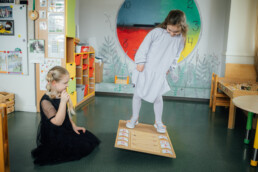
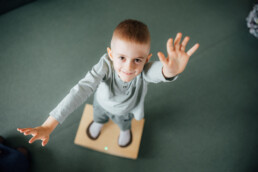
“Working as a clinical psychologist and educational psychologist in schools, I look for ways to make it easier for children to learn. I was also a special educator and provided help with learning. I started to involve motor coordination. I had studied many types of therapies and realised that we could stimulate the brain with movement,” says Baiba, recalling the creation of the method.
Initially, the team consisted of three specialists, who were taking the appointments for children also from other schools. That was a costly service for parents, says the founder. But the results were good, it helped children learn better. “We realised that parents were even taking out loans to pay for these classes. We felt uncomfortable as we were trying to help but at the same time it took so much from the families, so we decided to look for a solution and found out about social entrepreneurship. Our aim was to generate enough revenue through the sale of balance platforms to be able to help children in need. We succeeded in doing this, we established both a development centre and a kindergarten,” says Baiba Blomniece – Jurāne.
Thanks to Altum grant in social entrepreneurship, both the development centre and the “Barboleta” Smart Platform that works in conjunction with the app have been created. To make this innovative tool accessible to a wider audience, a Barboleta shop was set up. The app has been designed to make it easier for families and parents to use it at home instead of a lesson with a special educator, thus saving money.
Specialists, teachers, speech therapists and psychologists have training about the method, what it is based on and how to create tasks for the pupils so that the specialists can integrate and use their own materials. “I am teaching the technical part on how to use the balance platforms, and then each expert can use them according to their profession. If it’s a physiotherapist, they use them according to their needs, an occupational therapist, a social educator according to their own requirements. I don’t know everything, I just know what to do with the balance platform,” explains Baiba.
The social enterprise had gradually grown to 30 employees, a development centre and a kindergarten based on the Barboleta method. Baiba Blomniece – Jurāne was its founder, but now she was ready for changes. “Since 1st of November last year, I am working alone in the social enterprise, as I decided to focus exclusively on the development of the balance platform methodology,” says Baiba.
The establishment of the social enterprise has allowed us to help more children, to offer the method to a wider range of people, and currently around 400 teachers from different schools across Latvia are using the Barboleta platform in their work with children.
“Now that I am concentrating only on balance platforms, the goal is to develop the app, to develop wider accessibility so that more and more people can apply the method. At the moment the app is created for children aged 3 to 9-10, but I plan to expand it. All profits will be invested in creating an accessible product for a wider range of customers,” concludes Baiba Blomniece – Jurāne, optimistic about the future.
Social enterprise "Dzīves oāze"
“Dzīves oāze” (Oasis of Life), Riga
Group flat for people with mental disabilities, day care centre for people with dementia, family assistant services, father support groups.
The social enterprise “Dzīves oāze” offers a wide range of services to help seniors with dementia, people with mental disabilities, as well as families and especially fathers. For several years now, it has been run by Jānis Broks, who joined the care centre, which was on the verge of bankruptcy, in 2019. Since then, work has been completely reorganised and restructured, staff has been carefully selected, and attitudes towards clients have changed.
Intensive work is currently being done to develop the family assistant service and support groups for fathers. “I am particularly interested in this. I have developed and run a programme for another organisation before, and this is the second year we have been setting these groups,” says Jānis, proud of his work.
The support groups for fathers are organised in a series of eight sessions, which aim to educate and equip fathers with new skills, as well as to support them with practical tasks, encouraging them to believe in themselves. For some, the group provides support during divorce, helping them to learn how to organise their time, how to cooperate with the child’s mother and how to maintain the relationship with the child. Within the group, fathers learn to share and talk about different difficulties and solutions. “They open up and when there is a break between the sessions, they start discussing not only fishing and cars, but also children and issues they can solve. The programme is very simple on the one hand, but on the other hand it is built in such a way that the fathers discover their own resource, share their knowledge with each other,” says Jānis.
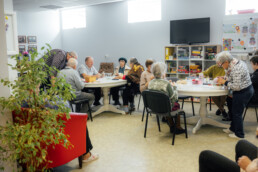
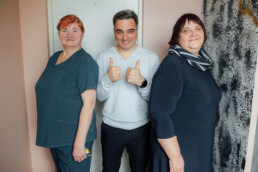
But the longest running of the centre’s two activities is a day centre for adults with dementia and a group flat for people with mental disabilities.
Day centre clients receive developmental and recreational activities, care during the day and they can return home in the evening. Clients who are attending the day centre have different levels of dementia, and for some it is their only chance to socialise. “On the other hand, it is also an opportunity for family members to stay socially active, as their loved ones are looked after, cared for and receive support that help them to remain functional,” says the company’s CEO. Currently, the centre can accommodate 20-25 people per day.
A group apartment is for people who have the capacity to take care of themselves but have difficulty living on their own because of mental disabilities. “Our job is to keep them active and social, not to let them get lazy,” explains Jānis Broks. They need help with things like budgeting, reminders, support and encouragement. Currently, 16 people live in the group flat, all of whom receive a pension, but many are also able to work. “A group flat is like one step. There are people who will always stay in a group flat, but there are many who are just initially either afraid or discouraged, or lacking the skills to be independent – we can help them get back on their feet. One of the most important things is that they find a job, that they stick to it and that it is a supportive environment. So, we look for employers who are open and willing to accept that this is a person with a disability,” says Jānis. So far, however, there are not many such opportunities on the Latvian labour market.
As for the day-to-day management of the centre, each service has its own team dedicated to one area, currently 15 people are employed.
The first year after joining the company was very hard and intense, but almost immediately the centre became a social enterprise. This seemed natural, as Jānis had previously been interested in this type of business. “It was on my radar and very much in line with how I see and do it. Initially, I didn’t even think about applying for grants and funding, it was more of an ideological, philosophical direction,” says Jānis Broks.
Social care has also been close to his heart for a long time. A psychologist by training, he also worked in schools, but when he found himself in a crisis centre, he immediately felt at home. “And at some point, I realised that I could work not just with one person at a time, but with a team. That’s when I started to think of myself as a manager,” says Jānis.
As for the future, he stresses that social services are always underfunded, and their providers are closely linked to local authorities. But “Dzīves oāze” aims to become more independent in this respect. “We want to develop the service ourselves and reach out to potential clients, because this is a very big problem, but very few people talk about it.”
SEAL members' experience exchange trip to Olsztyn, Poland
From May 20 to 24, an experience exchange trip took place in the city of Olsztyn in the northern region of Poland, bringing together representatives from three countries: Social Entrepreneurship Association of Latvia, social entrepreneurship association in Poland WAMA-COOP, and social enterprise in Slovenia KNOF. Three LSUA members participated in the trip, representing social enterprises from Latvia: Jānis Broks from the day center “Oasis of Life”, Agnese Gaidelione from the green lifestyle store “Pour in.lv,” and Ilze Saulāja from the Support and Development Center “TOGETHER”.
This trip was organized as part of the Erasmus+ project “Think globally, act locally – international partnership for effective social entrepreneurship education” and during these days, we visited:
- The day center for seniors and people with mental or physical disabilities “We are Together”;
- Food Bank;
- The natural food brand “Mazurskie Słoiki”;
- And the social cooperative café “Tradition”.

Olsztynek is a home to a famous ethnographic park that is popular in all Poland, and as the Poles themselves say, every student has gone there on a school trip at least once. In this ethnographic park, nestled among wide meadows and ancient houses, operates the social cooperative “Negocjator,” whose brand “Mazurskie Słoiki” grows natural plants within the park’s territory to create unique products that are in demand among regional restaurants.
The cooperative brings together many local home producers to collectively supply the necessary quantity of products to restaurants. We were given a wonderful opportunity to participate in a tasting and to purchase their special products – various locally made items such as jams, juices and syrups. Particularly noteworthy is the syrup made from rose petals, which, when mixed with water and a slice of lemon, makes an excellent summer lemonade.
Continuing with the theme of food and sustainability, which is one of the main focal points of the project, WAMA-COOP also introduced us to representatives from the food bank. This is an excellent example of how barracks and stables, so necessary during wartime but abandoned in the post-war years, can be transformed to meet modern needs.
Founded in 2000, the “Olsztyn Food Bank” is a non-profit organization with a mission to reduce the amount of food waste. The food acquired by the bank is donated to organizations that support people from at-risk groups. The organization conducts various food education events, such as cooking masterclasses with a chef, in which we also participated.
Each country worked in a group to prepare modern versions of traditional Polish dishes with the help of the chef. As the pots clinked and the smiles grew wider, we observed that this unique experience greatly resonated with our members.
In the “Food Bank” building, not only are cooking masterclasses held, but there are also modern co-working spaces for young entrepreneurs on the second floor. Meanwhile, on the first floor, the “Food Bank” representatives themselves work diligently at their computers, writing new projects and generating ideas.
In the city of Górowo Iławeckie, there is a social cooperative, the canteen “Tradition.” The second floor of the building houses a kindergarten, where the young students also have their daily meals. Social enterprise cooperatives in Poland are an important organizational form, meaning that several enterprises come together, collectively creating ideas and attracting funding. The WAMA-COOP association also participates in the cooperative formation process, providing funding to social entrepreneurs. “Tradition” is one such example.
The most emotional part of this trip was undoubtedly the visit to the day center for seniors and people with mental and physical illnesses, “We are Together.” In this day center, various activities take place every day, similar to a school schedule, where participants learn essential life skills, express their creativity, and enjoy their time in good company. The seniors’ genuine emotions upon seeing us were touching. Even though we spoke different languages, the language barrier in such situations is not felt, and the warmth and genuine joy are understood without the help of a translator.
The day center is free for it’s clients, and it also offers the possibility to stay overnight if needed. Daily, the center hosts various workshops where instructors teach how to cook, use a computer, create various items and souvenirs using handicraft techniques, and other skills. The most surprising feature was the television and radio studio, where, under the guidance of a journalist, the center’s residents prepare radio news and television segments that have been broadcasted on public media and are now available online. Additionally, the day center conducts professional themed photoshoots where residents dress up as characters from movies and fairy tales.
During the exchange trip, we not only visited various social enterprises but also met with local municipalities. The mayor of Olsztynek actively collaborates with the social entrepreneurship association WAMA-COOP and focuses on youth engagement and development opportunities. Meanwhile, small towns like Górowo Iławeckie join international networks with small towns from other countries to gain additional funding for improving the city’s and residents’ quality of life. Both visits demonstrated that the personalities of the people working in the municipality are a crucial factor in the development of the entire municipality, including the social entrepreneurship sector.
SEAL members after the trip acknowledged that they gained valuable insights and contacts, as well as the firsthand experience of good practices, which will be beneficial for the future development of their own businesses. Additionally, it provided extra motivation and energy for future endeavors.
Here are some quotes from the entrepreneurs themselves, translated in english:
“Thankful for the experience and excellent organization, as well as for introducing us to other entrepreneurs. We are taken care of and enjoying the process.”
I feel overwhelmed and pampered like a queen. My mind is finally free from work and daily routines, but ideas… ideas flow abundantly and I can barely keep up with jotting them down. Deeply grateful for this opportunity.
We observed that potential collaborations among entrepreneurs were discussed, with one member gaining motivation to enroll in an English language course and others creating social media profiles for their businesses and discussing marketing and financial strategies. Members acknowledged that this journey was also necessary for their mental well-being – to understand that they are not alone in facing challenges in running and maintaining their businesses. Often, mutual psychological support is the most crucial.
The trip also showed that Poles have generous hearts. Just as generous as the portions of their food 🙂 In the fall, it will be our turn to show hospitality to our project partners from Poland and Slovenia. This was the first on-site visit of the project. Since last year, we had only “met” each other through emails and video calls. In the fall, the second meeting of all three countries is planned – this time in Riga, and next year – in Slovenia. The goal of the trips is for social entrepreneurs from all three countries to gain new insights, knowledge, and contacts, as well as to adopt best practices for the future development of their own businesses.
———————————————————-
This trip took place within the framework of the “Think globally, act locally – international partnership for effective social entrepreneurship education” project, co-funded by the European Union’s Erasmus+ program.

Support House "Brīvupes"
Support House “Brīvupes” in Latgale, Balvi region
Family and child support services – Canisterapy, Montessori classes and other rehabilitation and developmental services not available in the immediate area.
Brīvupes Tutinava, Balvi, Kubulu parish, LV-4501
+371 28330904
Canisterapy, Montessori pedagogy, warm grain classes, audiologist and even a bed with vibroacoustic massage. Support House “Brīvupes” in Latgale brings all this together in one place, providing rehabilitation services and development-enhancing activities for children from different social groups, as well as their parents. The idea behind such a wide offer is simple – to bring the children to a pleasant place where they can participate in various activities in a familiar environment, changing only the specialists who work with them.
There’s also a guesthouse-like lounge, that you can book on Booking.com, for mums and dads to relax while their child is in class, or simply to recharge for a fresh start.
Ingrīda Supe, the manager of the social enterprise, admits that she would like the offer to be even wider, because each new case complements the previous one, allowing them to provide more and more comprehensive help to everyone who has found their way to “Brīvupes” in their particular situation. Thus, an audiologist has already come to “Brīvupes”, and now a music therapist is also being sought.
The plan is to develop support for parents who are often simply very tired from everyday stressful situations. With that in mind, for example, a specific bed has just been purchased, which, based on the principles of vibroacoustic massage, helps to relax and regain balance. Adults have a variety of workshops and masterclasses to participate such as gong meditation, there is enough of space for events and interest groups to share experiences, support each other and realise that they are not alone in their child’s problems. Ingrīda is also currently conducting a study on the benefits for parents of helping their child to develop.
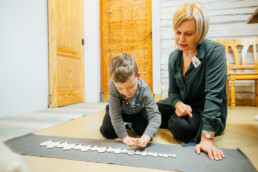
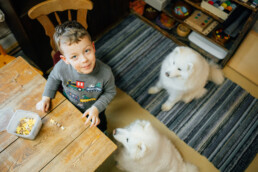
But it all started with canisterapy, or more precisely – Samoyeds. 15 years ago, it was love at first sight for Ingrīda – when she saw a dog of this breed, she knew immediately that if she ever had a dog in her life, it would be one like this. For the next seven years, Ingrīda spent dreaming and researching everything she could about the breed. And the more she read, the more she realised that for a dog to be happy, it also needs a job. Samoyeds proved to be suitable for canisterapy, and the idea clicked – it resonated with Ingrīda’s own feelings that a dog should not be selfishly kept to herself but shared to help others.
Now Dora is eight years old, she actively participates in the classes, helping children together with Ingrīda, and has welcomed a colleague – Sani, who now works at “Brīvupes”.
Nothing happens according to the same pattern – each clients’ problem is very different, solutions and approaches are different too, so Ingrīda is always learning, finding something new. She has also gained experience – in helping children with autism spectrum disorders, selective mutism, etc.
Ingrīda has a teaching background and has worked in a library for a long time. After learning canisterapy, she gradually became a full-time worker in her own enterprise and does not regret this choice for a moment. In addition, her previous education has now proved to be a very useful basis for further studies – she has also studied Montessori pedagogy and is currently studying social rehabilitation.
She came up with the idea of starting her own business when she realised that she needed a base, and her family home turned out to be ideal for this purpose, as well as cleaning up and restoring another “corner” of Latgale.
When asked about her plans for the future, Ingrīda says: “Ideas come naturally, the main thing is to let them mature.”
Working in a health centre as a canisterapy specialist would certainly be easier than building your own business from scratch – it takes courage, and in this case it could not be undertaken by someone who is just crunching numbers. She has travelled to Cēsis and Alūksne to work as a specialist, and it would have been more cost-effective for her to build her own business in the city, but the peaceful environment is also important in “Brīvupes”, which is healing in itself, and it would have been impossible to create one in a more populated area. This is also one of the reasons for the social enterprise status, as there are no equivalent services elsewhere in the region.
“I work with a sense of mission, purpose and overarching goal. This place has a social purpose – so parents can get services closer to where they live. Our people deserve a place like this, so they don’t have to travel a hundred kilometres, spend a whole day on the road. They deserve it to be closer!
I even had a situation where two children came in and said quietly: “You know what I like best? When you come in here, it smells like this!” Then I realised that I have done everything to make sure that the children here are healed not only by the classes, but also by the environment.”
The social enterprise status gave a good start for setting up the support house, filling it with content, which was important to Ingrīda – so that the children would immediately have materials to work with. But now Ingrīda also appreciates being part of the social enterprise community in another way – it is very satisfying to know that she can work with others who are involved in business for different social causes. “It immediately feels like it’s your own!” Ingrīda emphasises and admits that, of course, a social enterprise has to be able to make a profit, but without such a social cause she would not be able to work. Also, the example of other companies helps to overcome difficulties, because you can see that someone has managed with a similar goal, continues to work and has proved that it can be sustainable.
Photo exhibition "Social Entrepreneurship in Latvia"
A colourful photo exhibition invites you to get to know 10 Latvian social enterprises and their creators, who work in different fields, helping to solve everyday problems in society.
The photo exhibition “Social Entrepreneurship in Latvia” provides an opportunity to look into the stories of entrepreneurs who have decided to invest their everyday work and profits for the benefit of society, improving the everyday lives of their peers. From group apartments and innovative learning methods to bread therapy and discovering the invisible world, social enterprises across Latvia are working on a wide range of issues.
The exhibition has been organised by the Latvian Social Entrepreneurship Association together with Luminor bank and the Development Finance Institution ALTUM. It will be on display until 13 June at the shopping centre “AKROPOLE Alfa” on the 2nd floor, and in the summer the exhibition will also be presented in the regions.
“The ten stories show the diversity in fields of activity, regions and the changes brought about by social enterprises across Latvia. It was not easy to choose the heroes of the stories, as there are so many to highlight. Each year we will be able to add to this exhibition to continue telling the story of how to create positive change in a long term. These are stories of inspiration on how not to miss out and make your daily work meaningful by solving problems that matter to society,”
explains Regita Zeiļa, Director of the Latvian Social Entrepreneurship Association.


“Social entrepreneurship is not only about having the courage to turn your heart’s work into a product or service with added value, but also about focusing on issues that are important and relevant to society. While the exhibition sheds light on a small part of the story of social entrepreneurs, it is a unique insight into the daily lives of those who invest their time and expertise to make everyday life better and better for many. This exhibition could be an inspiration for an entrepreneur or an idea that hasn’t been fully thought out yet,” says Kerli Vares, Head of Luminor bank Latvia.
Reinis Bērziņš, ALTUM Chairman of the Board: “ALTUM has been working with social enterprises for more than five years, and so far we have supported more than 200 social enterprises in the joint programme of the Ministry of Welfare and ALTUM, allocating EUR 12 million in grants. This support has helped to develop social enterprises across Latvia. ALTUM will soon launch a new Social Entrepreneurship Programme, which will be open to both new social enterprises and those that have benefited from support in the past. We are also delighted to support this exhibition, which is a vivid and heartfelt insight into the vital work that social enterprises do for society as a whole.”
“We believe that diversity and equal opportunities are the foundations of an open, forward-looking and prosperous society. Working with the Latvian Social Entrepreneurship Association is a way for us to not only support social enterprises by bringing their stories to a wider audience, but also to inspire our visitors and provide an enjoyable and educational shopping environment. Therefore, I would like to invite everyone who goes to AKROPOLE Alfa for shopping to take a moment and visit the exhibition,” says Sanita Krīgere, Manager of AKROPOLE Alfa Shopping and Entertainment Centre.
The exhibition can also be viewed in digital version on the website of the Latvian Social Entrepreneurship Association www.sua.lv/izstade.
